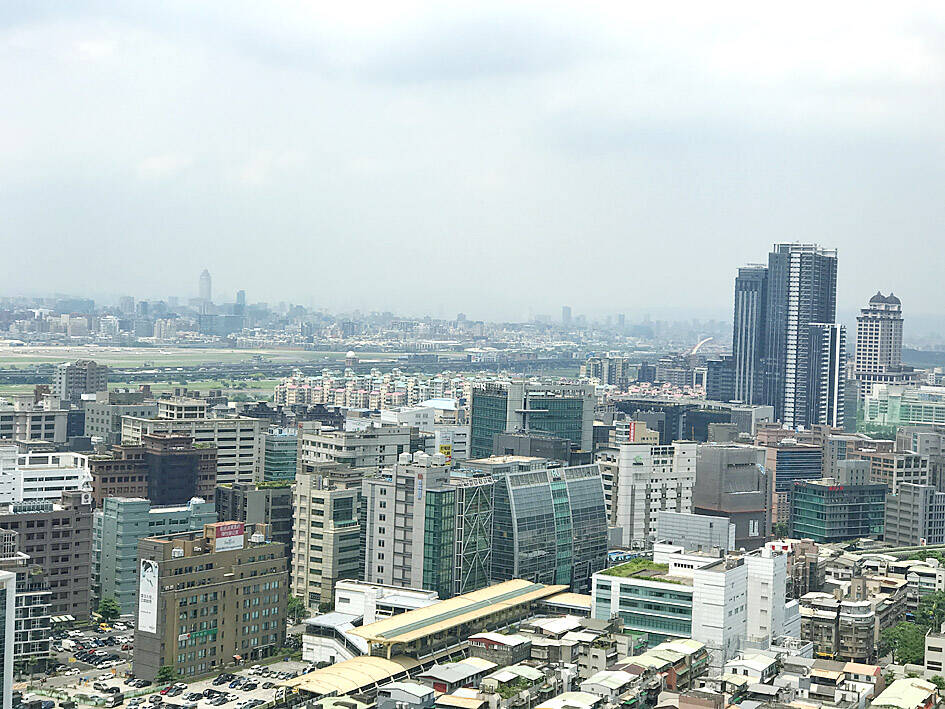The artificial intelligence (AI) industry boom is driving a significant increase in demand for large commercial real estate in Taiwan, particularly for corporate headquarters, Sinyi Global Asset Management Inc (信義全球資產管理) said yesterday.
Businesses are competing to acquire land so they can consolidate their various units into a single headquarters, Sinyi Global general manager Lin San-chi (林三智) said.
Transactions for plots of more than 500 ping (1,653m2) are on the rise. Some financially strong corporate clients are focusing on acquiring plots of more than 1,000 ping, Lin said.

Photo: Hsu Yi-ping, Taipei Times
Some companies have specific building layout requirements; for example, they want the style to fit with their corporate culture, Lin said.
Buying land and building their headquarters from scratch often better meets a company’s needs than purchasing and renovating an existing building, he added.
The surge in commercial investments is particularly evident in science parks like Neihu Technology Park (內湖科技園區) in Taipei, Lin said.
This area is experiencing a clustering effect of listed companies establishing a presence. There is also a rising trend of companies consolidating their units into one headquarters.
Developers and business owners are optimistic about growth potential and are acquiring land to construct headquarters, which has led to an increase in land acquisition, Lin said.
According to Sinyi Global Asset Management’s disclosed actual price registration data, land transactions in Neihu Technology Park have amounted to NT$43.3 billion (US$1.34 billion) since 2018.

JITTERS: Nexperia has a 20 percent market share for chips powering simpler features such as window controls, and changing supply chains could take years European carmakers are looking into ways to scratch components made with parts from China, spooked by deepening geopolitical spats playing out through chipmaker Nexperia BV and Beijing’s export controls on rare earths. To protect operations from trade ructions, several automakers are pushing major suppliers to find permanent alternatives to Chinese semiconductors, people familiar with the matter said. The industry is considering broader changes to its supply chain to adapt to shifting geopolitics, Europe’s main suppliers lobby CLEPA head Matthias Zink said. “We had some indications already — questions like: ‘How can you supply me without this dependency on China?’” Zink, who also

The number of Taiwanese working in the US rose to a record high of 137,000 last year, driven largely by Taiwan Semiconductor Manufacturing Co’s (TSMC, 台積電) rapid overseas expansion, according to government data released yesterday. A total of 666,000 Taiwanese nationals were employed abroad last year, an increase of 45,000 from 2023 and the highest level since the COVID-19 pandemic, data from the Directorate-General of Budget, Accounting and Statistics (DGBAS) showed. Overseas employment had steadily increased between 2009 and 2019, peaking at 739,000, before plunging to 319,000 in 2021 amid US-China trade tensions, global supply chain shifts, reshoring by Taiwanese companies and

Taiwan Semiconductor Manufacturing Co (TSMC, 台積電) received about NT$147 billion (US$4.71 billion) in subsidies from the US, Japanese, German and Chinese governments over the past two years for its global expansion. Financial data compiled by the world’s largest contract chipmaker showed the company secured NT$4.77 billion in subsidies from the governments in the third quarter, bringing the total for the first three quarters of the year to about NT$71.9 billion. Along with the NT$75.16 billion in financial aid TSMC received last year, the chipmaker obtained NT$147 billion in subsidies in almost two years, the data showed. The subsidies received by its subsidiaries —

At least US$50 million for the freedom of an Emirati sheikh: That is the king’s ransom paid two weeks ago to militants linked to al-Qaeda who are pushing to topple the Malian government and impose Islamic law. Alongside a crippling fuel blockade, the Group for the Support of Islam and Muslims (JNIM) has made kidnapping wealthy foreigners for a ransom a pillar of its strategy of “economic jihad.” Its goal: Oust the junta, which has struggled to contain Mali’s decade-long insurgency since taking power following back-to-back coups in 2020 and 2021, by scaring away investors and paralyzing the west African country’s economy.